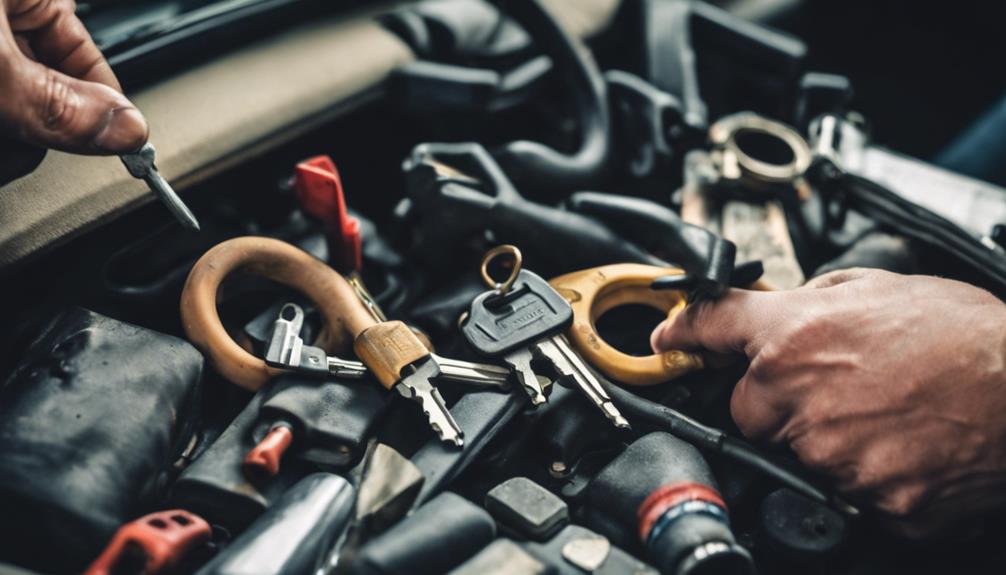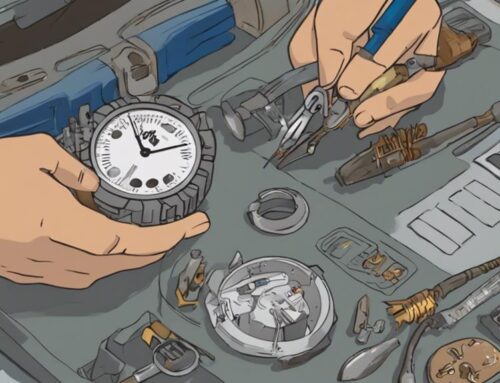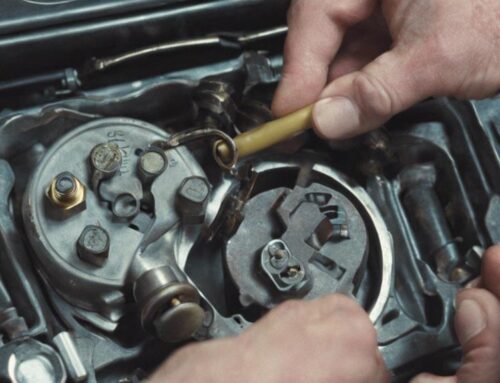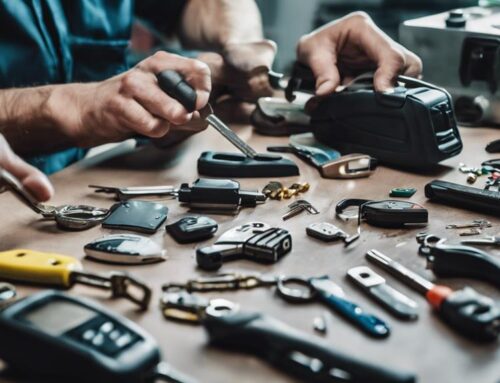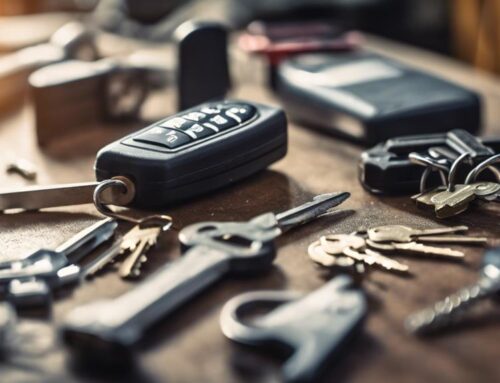You might not realize that rekeying a car ignition is a straightforward yet effective way to enhance your vehicle's security without the need for a full ignition replacement. This method involves adjusting the internal mechanisms so that old keys no longer function. But when exactly should you consider rekeying? Whether it's due to lost keys or a recent ownership change, understanding the signs that indicate it's time for this service can protect you from potential security threats. Let's explore the key factors that will help you decide if rekeying is the right choice for your situation.
Key Takeaways
- Rekeying a car ignition alters its internal mechanism to ensure only a new key operates it, enhancing security against unauthorized access.
- It's necessary when keys are lost, stolen, or if there are concerns about previous keyholders' access to the vehicle.
- New ownership of a vehicle often warrants rekeying to prevent security risks from unaccounted keys.
- Difficulty in turning the ignition may indicate the need for rekeying or other deeper issues affecting the ignition system.
- Rekeying is a cost-effective alternative to replacing the entire ignition system, preserving original components while enhancing security.
Definition of Rekeying
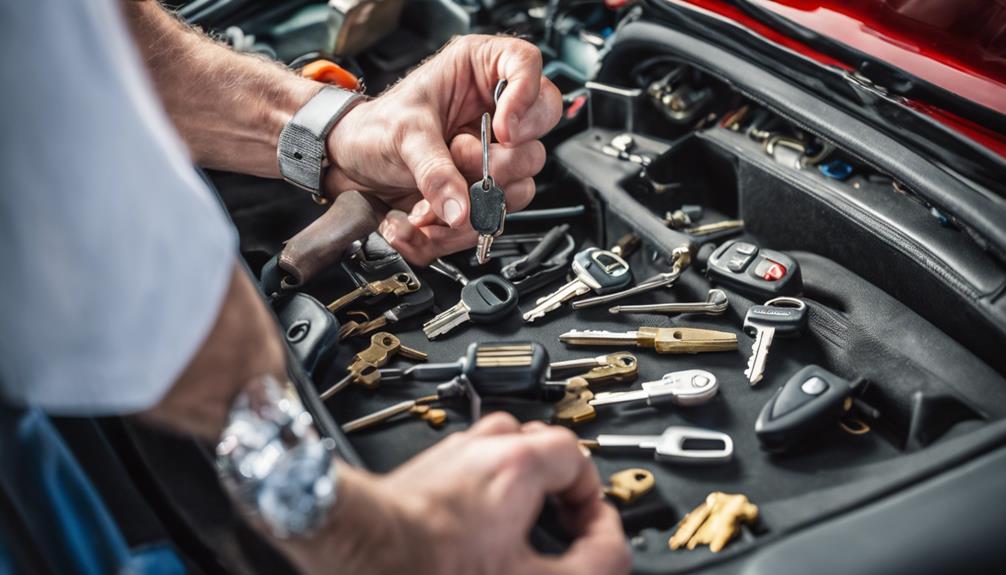
Rekeying a car ignition refers to the process of altering the internal mechanisms of the ignition cylinder so that a new key can operate it while rendering the old key ineffective. This procedure is essential for enhancing ignition security, especially if you've lost your keys or suspect unauthorized access. When you rekey, a locksmith adjusts the key mechanism inside the ignition, ensuring it only responds to the new key. This not only provides peace of mind but also safeguards your vehicle from potential theft. By understanding the significance of rekeying, you empower yourself to take control of your vehicle's security, making it a wise investment for any car owner who values their property.
How Car Ignition Works
The car ignition system is a critical component that starts your vehicle's engine and controls its operation. It relies on ignition mechanics, which involve the interaction between the ignition switch, battery, and starter motor. When you insert your key, the ignition switch activates the battery, sending power to the starter motor. This motor then engages the engine, allowing it to start.
Key compatibility is essential; if your key doesn't match the ignition system, it won't function. Modern vehicles often use transponder keys, which contain chips that communicate with the ignition system. Understanding these mechanics empowers you to maintain and troubleshoot your ignition system effectively, ensuring peak performance and security for your vehicle.
Reasons for Rekeying

Understanding how your car ignition works highlights the importance of maintaining its security. Rekeying your ignition can provide essential security enhancements for several reasons:
- Lost Keys: If you've misplaced your keys, rekeying prevents unauthorized access.
- Key Duplication: If someone has duplicate keys, rekeying guarantees they can't start your vehicle.
- New Ownership: When buying a used car, rekeying protects you from previous owners' access.
- Theft Prevention: If your vehicle's been targeted before, rekeying acts as a deterrent against future attempts.
Signs You Need Rekeying
If you've lost your keys or had them stolen, rekeying your ignition is essential for your vehicle's security. You should also consider rekeying if you're experiencing difficulty turning the ignition, as this can indicate potential wear or malfunction. Finally, if you've recently changed ownership of the car, rekeying guarantees that only authorized individuals have access.
Lost or Stolen Keys
Losing your car keys or having them stolen can create significant security concerns. If you're facing this situation, you should consider rekeying your ignition. Here are signs that rekeying is necessary:
- You can't find your keys: If they're genuinely lost, someone might find them and access your vehicle.
- You've had key duplication: If others have copies, your security is compromised.
- You've experienced theft: If your keys were stolen, immediate action is essential to safeguard your vehicle.
- You've lent your keys: If you've given keys to friends or service personnel, they could potentially misuse them.
In these scenarios, opting for a key replacement and rekeying your ignition will enhance your vehicle's security.
Difficulty Turning Ignition
When you experience difficulty turning your ignition, it could indicate a deeper issue with your vehicle's security system, suggesting that rekeying may be necessary. This problem often stems from misalignment between the key and the ignition cylinder. If your key doesn't fit smoothly or requires excessive force to turn, it's a sign of potential wear or damage. Misalignment can also lead to further complications, such as ignition lock failure, which could leave you stranded. It's essential to act swiftly; ignoring these symptoms can compromise your vehicle's security. Rekeying the ignition restores the precision of key alignment, ensuring your ignition functions flawlessly and enhances your control over vehicle access. Don't underestimate the importance of a reliable ignition system. Understanding the Costs of Rekeying Your Car Ignition
Recent Ownership Change
After acquiring a used vehicle, it's crucial to reflect on rekeying the ignition, especially if you can't confirm how many keys are in circulation. Ensuring ownership verification is critical to maintaining your vehicle's security. You may need to think about rekeying if you notice any of the following:
- You lack information on previous keyholders.
- The vehicle was purchased from a dealer with unclear key compatibility.
- The previous owner has mentioned lost or unaccounted keys.
- You want to enhance security for peace of mind.
Benefits of Rekeying
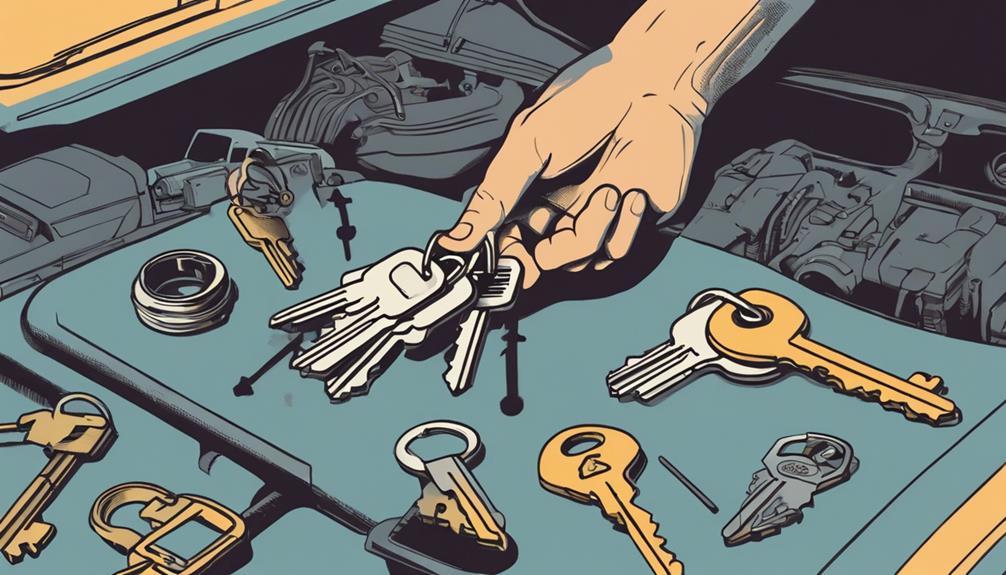
Rekeying your car ignition offers several significant benefits that can enhance both security and convenience. By changing the internal mechanism of your ignition, you achieve an essential security enhancement, ensuring that old keys can no longer access your vehicle. This is particularly important if you've lost a key or experienced a recent ownership change, as it prevents unauthorized access. Additionally, rekeying allows for improved key compatibility; you can streamline your keychain by having one key operate multiple locks if your vehicle supports it. This not only simplifies access but also minimizes the risk of carrying unnecessary keys. Overall, rekeying your ignition positions you firmly in control of your vehicle's security landscape.
The Rekeying Process
To successfully rekey a car ignition, you'll need specific tools and a clear understanding of the steps involved. First, gather essential tools like a rekeying kit, screwdrivers, and pliers. Then, you can follow the outlined process to effectively change the ignition's internal configuration.
Tools Required for Rekeying
When starting on the rekeying process for a car ignition, having the right tools at your disposal is essential for a successful outcome. You'll need specific rekeying tools to manipulate the ignition cylinder effectively. Here's what you should gather before you begin:
- Rekeying Kit: This includes various pins and springs tailored to your ignition cylinder.
- Tension Wrench: Essential for applying the necessary tension while you work on the rekeying.
- Screwdrivers: A set of precision screwdrivers helps you remove and reinstall the ignition cylinder.
- Key Gauge: This tool assists in identifying the appropriate pins for your new key configuration.
With these tools at hand, you're well-equipped to tackle the rekeying process confidently.
Steps in Rekeying Process
Before diving into the rekeying process, it's crucial to understand the specific steps involved to guarantee a seamless execution. Following these steps will enhance your ignition security and employ effective locksmith techniques.
| Step | Description |
|---|---|
| 1. Remove Ignition | Use a screwdriver to detach the ignition from the steering column. |
| 2. Disassemble | Carefully take apart the ignition cylinder, noting the arrangement of pins. |
| 3. Replace Pins | Use new pins that match your desired key, verifying they align correctly for maximum function. |
Once reassembled, test the new key to confirm it turns smoothly. By following these detailed steps, you'll enhance your vehicle's security, providing peace of mind against unauthorized access.
Comparing Rekeying and Replacing
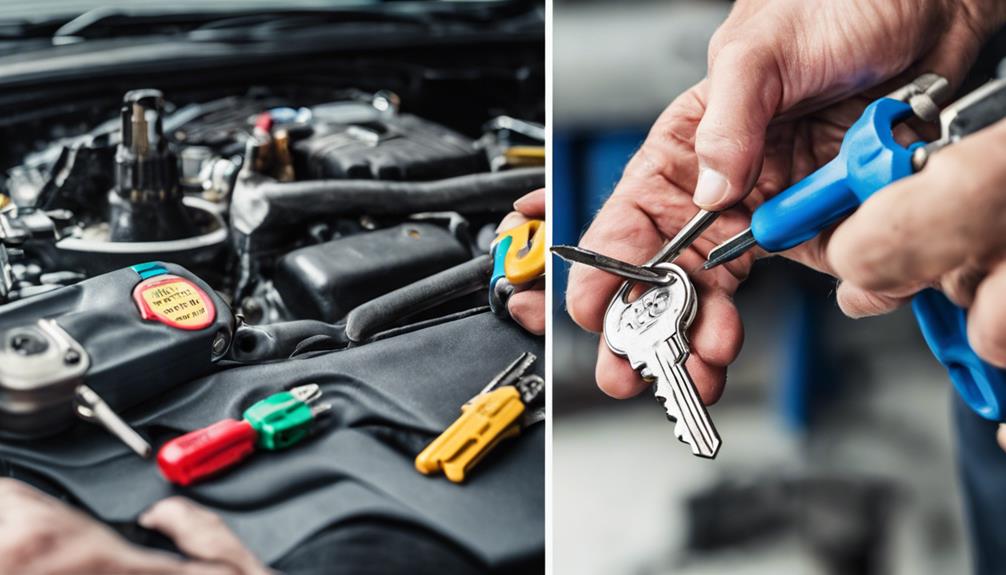
Rekeying a car ignition and replacing it are two distinct approaches to addressing security concerns or key compatibility issues. When considering your options, you'll find that rekeying offers several advantages over a full replacement:
- Cost-Effective: Rekeying typically costs less than replacing the entire ignition system.
- Time-Saving: The rekeying process is quicker, minimizing your downtime.
- Enhanced Ignition Security: Rekeying reduces the risk of unauthorized access while maintaining your current ignition system.
- Preservation of Original Components: You keep your existing ignition, which may be beneficial for vehicle functionality.
Ultimately, the choice between rekeying benefits and replacement hinges on your specific needs for ignition security and budget.
Cost of Rekeying Services
Choosing to rekey your car ignition can lead to significant savings, especially when you consider the costs associated with a full replacement. Typically, rekeying costs range from $75 to $150, depending on your vehicle's make and model. Locksmith pricing can vary based on factors like location, complexity of the ignition system, and whether you're accessing emergency services. While some may perceive rekeying as a minor task, remember that it requires specialized tools and expertise. Investing in professional services guarantees that the job is done correctly, enhancing your vehicle's security without breaking the bank. Ultimately, rekeying is a powerful solution that can provide peace of mind while preserving your budget.
Low Rate Locksmith Services
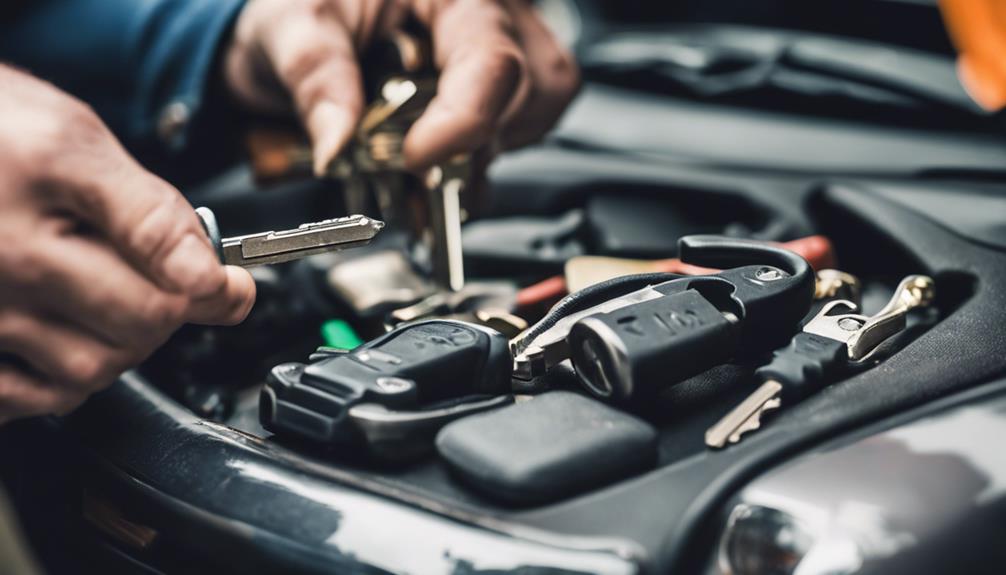
When you need car ignition services, finding low-rate locksmith options can make a significant difference in your overall expenses. Affordable locksmiths often provide a range of services tailored to your needs without compromising quality. Here's what to evaluate:
- Emergency Services: Many locksmiths, like Always-Available Locksmiths, offer 24/7 assistance, ensuring you're covered anytime.
- Transparent Pricing: Look for locksmiths who provide upfront quotes to avoid hidden fees.
- Experience and Expertise: Choose locksmiths with proven experience in rekeying ignitions, ensuring the job is done right.
- Customer Reviews: Check testimonials to gauge satisfaction levels and service reliability.

